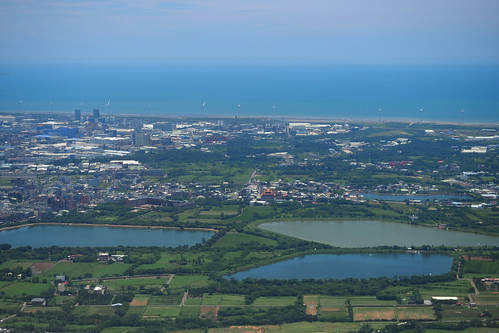China’s ‘Destroyer of Peace’ Wins Taiwan Election in Blow to Xi Jinping
Taiwan #Taiwan

Taiwan’s Vice President Lai Ching-te won the self-ruled island’s presidential election on Saturday in a blow to China, which had branded him a “destroyer of peace.”
China had warned Taiwan its contest amounted to a choice between war and peace. Beijing claims sovereignty over the island and has vowed to unify with it—through force if necessary—though the Chinese Communist Party has never governed there. The United States supports Taiwan’s self-rule and provides it with defensive weapons, to China’s fury.
Taiwan’s election comes at a time of global turbulence, with the United States already preoccupied supporting wars in Ukraine against China’s Russian ally and in the Middle East, where Israel is fighting Iranian-backed Hamas and Hezbollah and where the U.S. has struck Yemen after related attacks on shipping by Houthi rebels.
The vote in Taiwan handed the incumbent Democratic Progressive Party (DPP) an unprecedented third term in power.
The election pitted Lai of the Beijing-skeptic ruling party against New Taipei City Mayor Hou Yu-ih of main opposition party the Kuomintang (KMT) and Ko Wen-je, former Taipei mayor and founder of the upstart Taiwan People’s Party.
Hou conceded defeat in a speech at his campaign headquarters. Results showed Lai with over 40 percent of the vote counted at that point with just over 33 percent for Hou and 26 percent for Ko.
Lai said in his victory message that he would maintain the status quo with China, but would continue to defend Taiwan’s democracy. He said that his victory showed Taiwanese had resisted outside influence — a veiled reference to China.
“The Republic of Taiwan will continue to walk side by side with democracies from around the world,” Lai said.
Some 19.54 million citizens, or 83% of the population, were eligible to cast their ballots, including about 1.03 million first-time voters, according to Taiwan’s Central Election Commission.
Supporters of Taiwan’s ruling party candidate Lai Ching-te celebrate early results showing him in the lead. Lai won the election in a blow to China. Matthew Tostevin for Newsweek
China had labeled Lai a “destroyer of peace across the Taiwan Strait” and had made clear that Hou was its favored candidate. The ruling party had accused China of using all means to interfere in the vote. Chinese President Xi Jinping has repeatedly stressed that China sees Taiwan as an integral part of the country and will ultimately bring what it regards as a renegade province back into the fold.
“China says we are part of them. But that’s not the case… Lai is the best candidate, in my opinion. He is the one who can stop the war.” Alex Liu, a Taipei resident in his 20s told Newsweek after voting. “Other parties will sell out to China.”
The United States has long supported Taiwan’s self-rule, and all three candidates had underscored the importance of amicable relations with Washington.
Their differences on policy with Beijing were nuanced. None of the candidates had said they would declare independence — the absolute red line for China. Likewise, none of them had said they would seek the unification that China wants but which is opposed by the vast majority of people in Taiwan.
Most Taiwanese currently favor the maintenance of the status quo, in which Taiwan continues to administer itself but does not declare independence.
While the DPP has held onto the presidency, it appeared to have lost its grip on Taiwan’s 113-seat egislature, wwhich would make it harder to govern.
Sean King, an Asia scholar and senior vice president of New York-based consultancy Park Strategies told Newsweek that for the People’s Republic of China (PRC), Taiwan stands as the most critical issue in its relations with the United States. Regaining control of the island was essential for the maintenance of Communist Party rule in the long term, he said.
“The Chinese Communist Party has staked its reputation and standing on Chinese nationalism,” he said.
Acquisition of Taiwan would provide Beijing with strategic advantages, including the projection of naval power into the Western Pacific.
“A disruption to peace and stability across the Taiwan Strait would seriously damage the global economy, and the spillover would affect all economies around the world,” a senior official in the administration of U.S. President Joe Biden said on background Thursday in a teleconference with the press centered on Taiwan’s election.
Updated on 01/13/2024 at 7.52 a.m. ET with quotes from Lai’s victory message
Newsweek is committed to challenging conventional wisdom and finding connections in the search for common ground.
Newsweek is committed to challenging conventional wisdom and finding connections in the search for common ground.
“);jQuery(this).remove()}) jQuery(‘.start-slider’).owlCarousel({loop:!1,margin:10,nav:!0,items:1}).on(‘changed.owl.carousel’,function(event){var currentItem=event.item.index;var totalItems=event.item.count;if(currentItem===0){jQuery(‘.owl-prev’).addClass(‘disabled’)}else{jQuery(‘.owl-prev’).removeClass(‘disabled’)} if(currentItem===totalItems-1){jQuery(‘.owl-next’).addClass(‘disabled’)}else{jQuery(‘.owl-next’).removeClass(‘disabled’)}})}})})